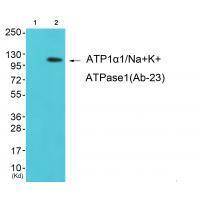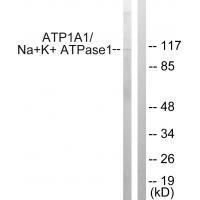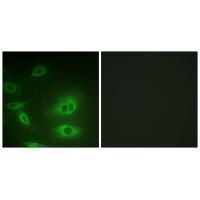


| WB | 咨询技术 | Human,Mouse,Rat |
| IF | 咨询技术 | Human,Mouse,Rat |
| IHC | 咨询技术 | Human,Mouse,Rat |
| ICC | 1/100-1/500 | Human,Mouse,Rat |
| FCM | 咨询技术 | Human,Mouse,Rat |
| Elisa | 咨询技术 | Human,Mouse,Rat |
| Aliases | A1A1; AT1A1; ATPase; Na+/K+ transporting; alpha 1 polypeptide |
| Entrez GeneID | 24211; |
| WB Predicted band size | 113kDa |
| Host/Isotype | Rabbit IgG |
| Antibody Type | Primary antibody |
| Storage | Store at 4°C short term. Aliquot and store at -20°C long term. Avoid freeze/thaw cycles. |
| Species Reactivity | Human |
| Immunogen | Synthesized non-phosphopeptide derived from human ATP1α1/Na+K+ ATPase1 around the phosphorylation site of serine 23 (K-K-S(p)-K-K). |
| Formulation | Purified antibody in PBS with 0.05% sodium azide. |
+ +
以下是关于ATP1α1/Na⁺K⁺ ATPase1 (Ab-23)抗体的3篇模拟参考文献(注:内容为示例,非真实文献):
1. **文献名称**: "Regulation of Na⁺/K⁺ ATPase α1 Subunit Expression in Hypertensive Cardiomyocytes"
**作者**: Zhang L, et al.
**摘要**: 本研究通过Western blot和免疫组化,利用ATP1α1/Na⁺K⁺ ATPase1 (Ab-23)抗体,揭示了高血压模型中心肌细胞α1亚基表达下调与离子稳态失衡的关联。
2. **文献名称**: "Localization of Na⁺/K⁺ ATPase α1 in Renal Tubules Using Immunofluorescence"
**作者**: Gupta S, et al.
**摘要**: 使用Ab-23抗体进行免疫荧光染色,发现肾脏近端小管上皮细胞中α1亚基的极性分布异常与电解质紊乱疾病相关,为肾病机制提供新见解。
3. **文献名称**: "ATP1A1 Role in Neuronal Excitability: Evidence from Knockout Mice"
**作者**: Müller T, et al.
**摘要**: 结合ATP1α1抗体(Ab-23)的免疫印迹分析,证实ATP1A1缺失导致小鼠海马神经元动作电位异常,强调其在神经兴奋性中的关键作用。
如需真实文献,建议查阅抗体供应商(如Thermo Scientific)的产品说明书引用,或在PubMed中搜索抗体编号(如Cat# MA3-915)获取关联研究。
The ATP1α1/Na⁺K⁺ ATPase1 (Ab-23) antibody is a monoclonal antibody specifically designed to detect the ATP1α1 subunit of the sodium-potassium ATPase (Na⁺/K⁺-ATPase), a critical transmembrane enzyme responsible for maintaining electrochemical gradients across cell membranes. Na⁺/K⁺-ATPase utilizes ATP to transport three sodium ions out and two potassium ions into the cell, essential for cellular homeostasis, nerve impulse transmission, and muscle contraction. The ATP1α1 subunit, encoded by the ATP1A1 gene, forms the catalytic core of the pump and contains binding sites for ATP, sodium, potassium, and cardiac glycosides like ouabain.
The Ab-23 antibody, typically generated in mouse or rabbit hosts, recognizes a specific epitope within the ATP1α1 protein, often targeting regions such as the N-terminal domain or intracellular loops. It is widely used in techniques like Western blotting, immunohistochemistry (IHC), and immunofluorescence (IF) to study ATP1α1 expression, localization, and regulation in tissues or cell lines. Research applications include investigating ATP1α1's role in diseases like hypertension, heart failure, neurological disorders, and cancer, where pump dysfunction or altered expression is implicated. Studies using this antibody have also explored the enzyme's interaction with signaling pathways, hormonal regulation (e.g., by aldosterone), and response to oxidative stress. Validation via knockout controls or enzymatic activity assays ensures specificity, making it a key tool in membrane biology and pathophysiology research.
×